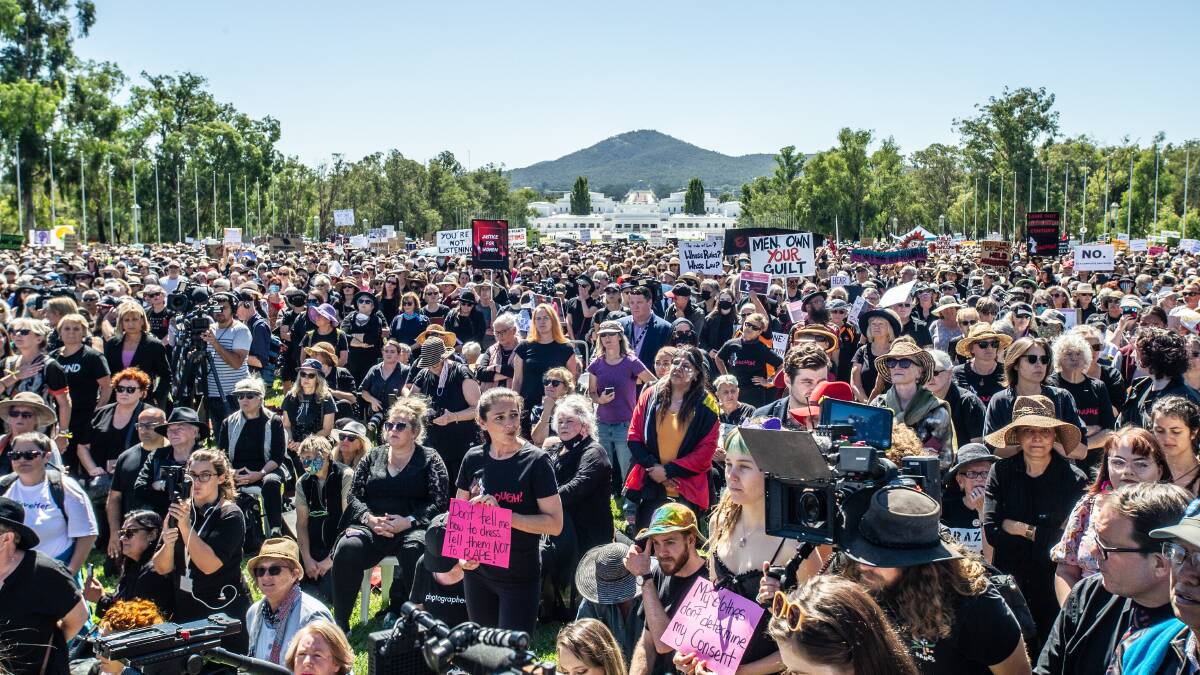
Two years since many hundreds of thousands of women (and some men) marched for justice for women across Australia, we find poverty, like violence, continues to be gendered.
Subscribe now for unlimited access.
or signup to continue reading
At least 100 women have been killed due to violence in Australia since we marched in 2021, according to the Counting Dead Women Australia researchers of Destroy The Joint.
Not only are women more likely to be victims of violence, they are more likely to live in poverty as they make up more than six in 10 of all those relying on the lowest income support payments including JobSeeker, parenting and student payments. They are also more likely to need homelessness services.
Figures from the royal commission released by Government Services Minister Bill Shorten last week confirmed another depressing statistic - the majority of robodebt victims were women.
Single mother families in particular are doing it toughest - the Life Course Centre analysed the HILDA survey from 2001 to 2020 for Anti-Poverty Week 2022 and found single mothers are at a significantly greater risk of being in financial hardship than partnered mothers and fathers. The risk of financial hardship for single mothers is at least double that of partnered mothers.
In his sadly titled seminar The declining wellbeing of Single Parents in Australia in the 21st century, Professor Roger Wilkins reports single parents are twice as likely to be caring for a child with disability - 16 per cent compared with 8 per cent of partnered parents. Bringing up a child with disability can be incredibly rewarding but also incredibly challenging - it can lead to relationship breakdown, with mothers left to manage as best they can. He also found single parents were less likely to be regularly receiving child support in 2020 than in 2001-03 and those who did received one-third less than before.
READ MORE:
When women leave a violent relationship or find themselves on their own bringing up children, they're punished with an inadequate system of income and housing support and the consequences can affect their lives deep into their retirement years.
Women or girls made up more than six in 10 clients of homelessness services in 2021-22. Yet this government is allowing a $65 million cut in homelessness services due to its failure to commit to subsidise wages beyond this date. It is staggering the service with a 75 per cent female workforce which predominately serves the most disadvantaged women and girls could be forced to sack staff and cut services during this unprecedented housing crisis.
The federal government's Women's Economic Equality Taskforce is rightly focusing its attention on women facing the greatest disadvantage. Currently single parents must transfer to JobSeeker when their youngest child turns eight. A child's birthday dreaded by hundreds of thousands of mothers. Transferring to JobSeeker means a cut of at least $100 a week in income support and includes a harsher income test, so they retain less of their earnings. The current system locks them in poverty instead of providing the means to escape it.
The taskforce chair Sam Mostyn, speaking at the National Press Club, said they are recommending a restoration of the Parenting Payment Single to at least high-school age. While this is essential to right the shameful wrong imposed by the Howard and Gillard governments, more than 230,000 single parents already on the Parenting Payment Single would receive no help from this change. Ms Mostyn also said they are also recommending abolishing the Parents Next program which can be imposed when children are as young as nine months old. We've heard shocking evidence of far too many single parents, mostly mothers, having their family's income suspended resulting in, as Senator Katy Gallagher said on radio "losing money when you're already, you know, living hand to mouth and trying to raise children".
The single most effective solution to poverty in Australia, which will lift more women out of poverty than any other action, would be increasing the rate of JobSeeker and related payments as was shown in the pandemic. This will help all 1.4 million people relying on these low payments including 30 percent of whom are parents, caring for over 830,000 children.
Speaking at the Senate hearing into Poverty, I quoted Nelson Mandela, "Overcoming poverty is not a gesture of charity. It is an act of justice." Let's not wait another two years for justice for women and all affected by poverty.
- Toni Wren is the executive director of Anti-Poverty Week which supports the Australian community to have an increased understanding of poverty and to take action collectively to end it. Anti-Poverty Week is 15-21 October, 2023

